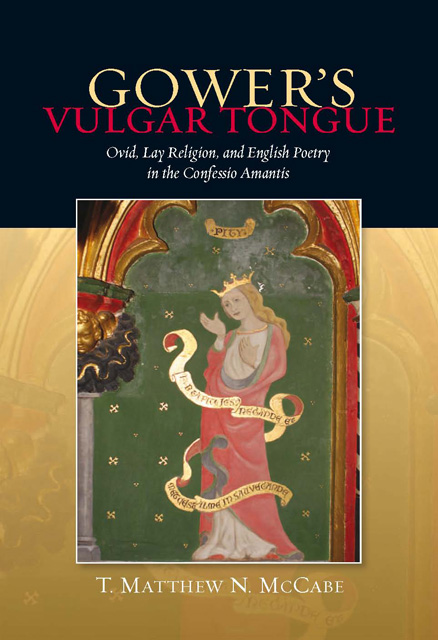Book contents
- Frontmatter
- Contents
- Acknowledgments
- Note on Abbreviations and Editions
- Abbreviations
- Introduction: Vernacularity and Public Poetry
- 1 Gower’s Ovidian Voice in English
- 2 English Writing and Lay Theology
- 3 At the Limits of Clerical Discourse
- 4 Kinde Grace
- 5 Ethics, Art, and Grace
- Conclusion: Gower and Public Poetry
- Bibliography
- Index
Conclusion: Gower and Public Poetry
Published online by Cambridge University Press: 14 February 2023
- Frontmatter
- Contents
- Acknowledgments
- Note on Abbreviations and Editions
- Abbreviations
- Introduction: Vernacularity and Public Poetry
- 1 Gower’s Ovidian Voice in English
- 2 English Writing and Lay Theology
- 3 At the Limits of Clerical Discourse
- 4 Kinde Grace
- 5 Ethics, Art, and Grace
- Conclusion: Gower and Public Poetry
- Bibliography
- Index
Summary
Winthrop Wetherbee has suggested that the vexed, sublunary spaces in which the Confessio’s English narratives move evoke a condition of “existential doubt.” The poem indeed shows a heightened appreciation for moral and epistemic complexity, especially when considered next to the Mirour and Vox, and the many Gowerian firsts represented in the Confessio—its greater reliance upon narrative and especially mythic narrative, its sustained preoccupation with love, its deeper interest in affect, its wider range of voicings, its fuller use of dialogue, its virtual abandonment of an authoritative voice in favor of flawed speakers, and its heightened awareness of textual slippage— are all readily associable with the newly problematized, oblique didacticism of Gower’s “middel weie” (Prol. 17–19, *84–5). Notwithstanding the recent critical focus on the ways in which Gower’s major French and Latin writings also foreground linguistic fragmentation, doubt, and lability, “existential doubt” describes a quality that is much moreclearly on display in the Confessio.
But as we saw in chapter 1, Gower’s commitment to publicizing moral doctrine for the sake of “common profit” remains strong. As we saw there also, Gower deploys Ovidian myth in ways that call attention to myth’s accessibility, thus conferring on his English poem a markedly lay character. That Gower’s public rhetoric should become so much more strongly racked by doubt—and that it should become so much more markedly lay—at the very time that he took up a large-scale work in the most public of England’s languages invites questions about the status of English in the 1380s. Indeed, the stakes rise considerably in light of further evidence, presented in chapters 2 and 3, that the Confessio actively diminishes the utility of book-learning for the transmission of ethics and thus attains a degree of extraclergiality that reaches considerably further than scholars have recognized.
But as those chapters demonstrate, Gower’s reasons for putting away the comparatively clergial strategies of predication that were so important to the Vox and the Mirour, especially as those poems seem to have been initially conceived, have as much to do with their author’s new interest in affective rhetoric as they do with any constraints imposed by Gower’s choice of English.
- Type
- Chapter
- Information
- Gower's Vulgar TongueOvid, Lay Religion, and English Poetry in the <i>Confessio Amantis</i>, pp. 227 - 232Publisher: Boydell & BrewerPrint publication year: 2011

